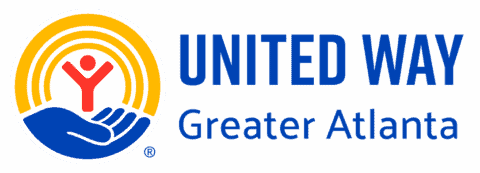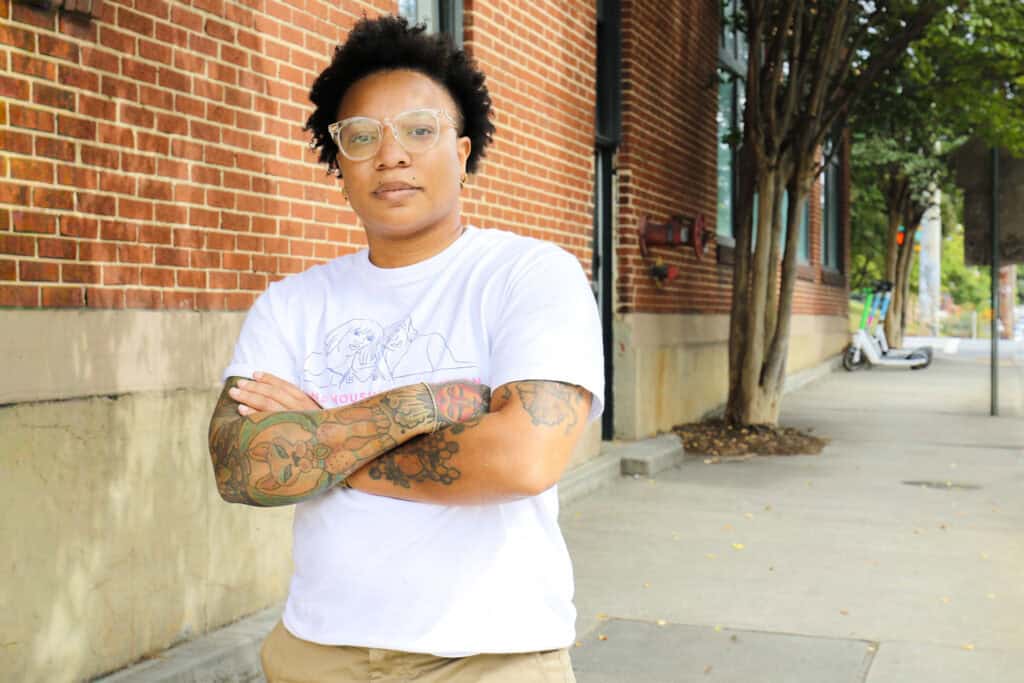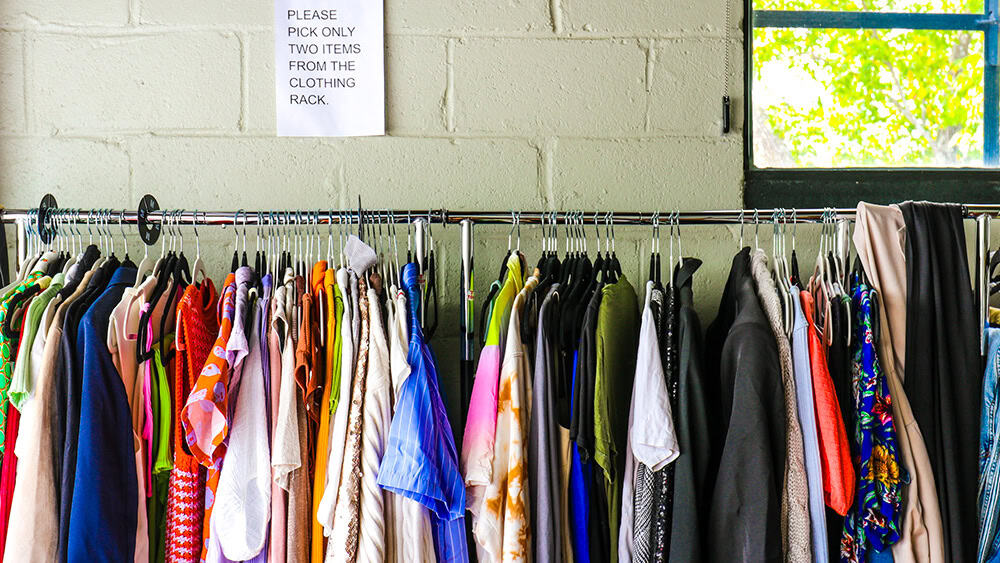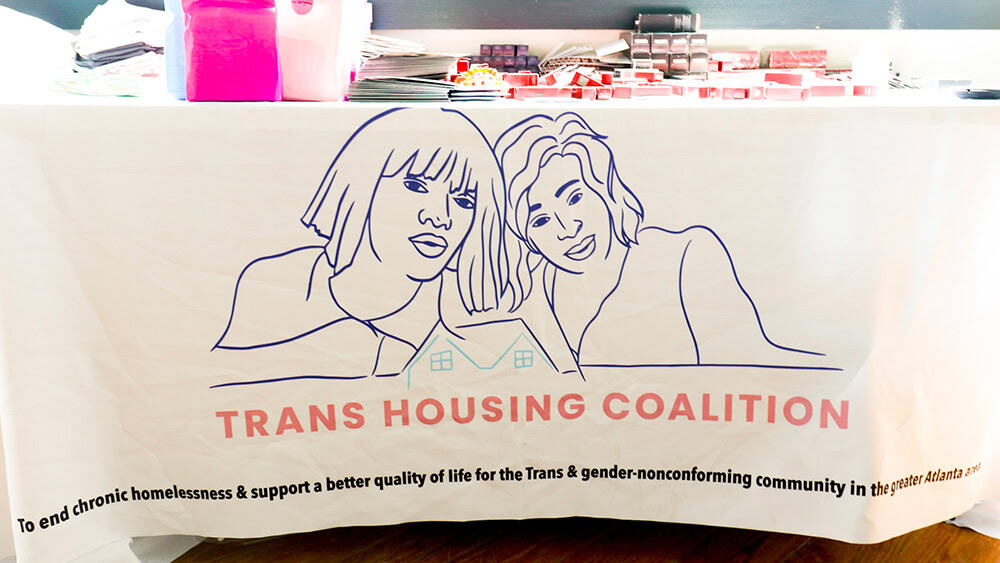Take a walk down the streets of Atlanta, and you’re bound to see—or look away from—the faces of neighbors experiencing homelessness. In 2019, Trans Housing Coalition (THC) Founder and photographer Jesse Pratt Lopez refused to look away. She began photographing women on the street around Piedmont Avenue, drawn to their strength and resilience.
The LGBTQIA+ community has always been disproportionately represented in our nation’s homelessness epidemic due to community rejection and employment discrimination, and transgender people often face discrimination at even higher rates.
According to current THC Executive Director Mary Wilson, the median income for Black transgender women whom they serve is typically just $11,000 annually. What’s more, nearly 1 in 3 transgender individuals will experience homelessness in their lifetime.
“I realized that I had never met another trans woman who hasn’t dealt with housing insecurity and who didn’t have to do sex work to survive at some point,” Jesse Pratt Lopez wrote on their website. “I also realized this: while much of the world pretends we don’t exist, we are here, we have always been here, and we’re not going anywhere.”
What began as a personal photography project soon caught the attention of a broader community—and eventually, organizations like United Way of Greater Atlanta.
From portraits to permanent housing
United Way of Greater Atlanta has supported Trans Housing Coalition since 2021, the first year of our OUT Georgia Impact Fund, a partnership with the OUT Georgia Business Alliance that provides grants to LGBTQIA+-led and serving organizations like THC.
“In that first year of applying, it’s really a lot of nos. They don’t know who you are. You’re a fresh, new nonprofit,” said Mary. “In the past three years now, the impact is that we’ve served 300+ clients. And honestly, that’s been the help of OUT Georgia. They really kicked things off.”
With the support of our OUT Georgia Impact Fund, THC has moved from a grassroots effort completely reliant on crowdfunded donations to an established organization that houses an average of 80-100 clients a year. They also provide eviction prevention assistance, therapy referrals, food and hygiene resources, gender-affirming clothing and make-up, and help navigating healthcare and legal systems.
There’s a significant lack of knowledge and funding for trans-focused nonprofits, according to Mary, but the trans community has unique experiences and needs that only specialized organizations like THC are prepared to meet. Each THC case manager helps about 15 clients at a time, working with them—often through addiction, trauma, and health barriers—to move into secure housing.
“A lack of housing is the main crisis,” explained Mary. “Once folks are housed, the other crises like employment or being sober take care of themselves…What happens with clients is that housing brings stability, and that stability will bleed out into other areas of their life.”
Thanks to THC’s advocacy, larger shelters like Vision of Hope and Salvation Army now reserve beds specifically for trans individuals so they can be sheltered safely while waiting to find permanent homes. And THC will continue to work with clients for two months after they’re in stable homes to provide ongoing support.
A vision for the future: safety and inclusion for all
For decades, United Way of Greater Atlanta has championed community-led solutions as the most effective path to long-term change. Whether through our community grant making programs, support for innovative local small businesses, or the OUT Georgia Impact Fund, we invest in organizations that are rooted in the communities that they serve. Supporting nonprofits like THC—led for and by the trans community—is just one way we carry out this approach.
“No one is going to fully understand the plight of an LGBTQIA+ individual more than someone that is in that community. We live in a world where folks want to try and tell you what is needed, what is going to fix things. But until you’re steeped in the work of that community, you’re not going to know how to move the community forward—and that is the secret sauce that is United Way of Greater Atlanta,” explained Troy Parker, Senior Director of Corporate Relations at United Way and OUT Georgia Impact Fund liaison for the past three years.
The need for inclusive solutions is only growing in Atlanta, according to Mary.
“Because of so much anti-trans legislation, we are seeing an influx of applications. We’ve always had a wait list, but we’re seeing even more coming from Florida, Tennessee, and Alabama. It would be great to get more case managers because we just have so many people who need help, especially in Atlanta with the housing crisis,” she said.
>>RELATED: From Homelessness to Helping Others
Mary has high hopes for the future of THC, with plans to open a shelter option at their office with a fully functioning drop-in center, so those who aren’t ready to get off the streets can still receive harm-reduction care like clean needles, clothes, wigs, makeup, and showers. She even hopes to employ some of these folks who have been able to get stable and change their lives as additional case workers.
THC is just one of the LGBTQIA+ serving nonprofits that United Way of Greater Atlanta has partnered with to help build a stronger future throughout the state of Georgia. Since 2021, we’ve invested $200,000 in 19 additional organizations that are making lasting change in the lives of Georgia’s LGBTQIA+ community through our OUT Georgia Impact Fund.
From empowering LGBTQIA+ youth to achieve college and career goals, to supporting LGBTQIA+ owned small businesses, and helping those across the community access housing and other basic needs—with your help, we can continue to make an impact. Donate today to continue to support a more inclusive future for Greater Atlanta.




